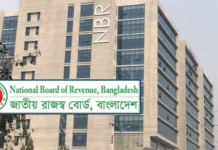Competition is set to intensify for Bangladesh’s apparel sector as the European Union has granted trade privileges to Pakistan.
The duty waiver scheme, known as generalised system of preferences, will come into effect for Pakistan from January 1 and will apply to 75 products, mostly garments. It ends in 2017.
Bangladeshi garment makers said the duty privilege will boost Pakistan’s exports by $1 billion a year to the EU market, which now consumes 60 percent of Bangladesh’s total garment exports.
At present, Pakistan exports garments worth more than $6.1 billion to the European bloc, and once the duty benefit takes effect, Bangladesh will have to compete with Pakistan in the market.
Under the same scheme, Bangladesh as a least developed country enjoys complete duty waiver from the EU for all products except arms.
Without GSP, Bangladesh would have to pay 12.5 percent duty on its $12.57 billion garment exports recorded last year.
“A good number of orders, especially knitwear, have already shifted to Pakistan from Bangladesh as retailers knew about the award to Pakistan from before,” said Shahidullah Azim, acting president of Bangladesh Garment Manufacturers and Exporters Association.
The EU started considering the GSP status for Pakistan in October 2012, after the country was affected by devastating floods in 2010.
“Our garment sector is already being affected by the current political deadlock. Eroding competitiveness will only mean trouble for us,” Azim said.
Retailers do not want to continue work in a risky environment in Bangladesh; Pakistan will be their next best choice as the South Asian nation has an important raw material, cotton, he added.
If Pakistan can impress the retailers, they will not go to other destinations, he said.
Bangladesh’s garment sector is already losing its competitiveness due to the falling Indian rupee and an appreciating taka against the dollar.
Normally, such a move by the EU would not have affected Bangladesh, said Mustafizur Rahman, executive director of Centre for Policy Dialogue. “But timing is a factor, as the garment sector is passing an unstable political situation now.”
Earlier, Bangladesh urged the EU to set a cap on the import of Pakistani products, as both the nations produce some common items. But the EU did not set the cap, and awarded the GSP status to Pakistan on December 12.
Bangladesh exported garment products worth $12.57 billion to the EU in fiscal 2012-13 and $11.38 billion in fiscal 2011-12, according to data from Export Promotion Bureau. Due to the GSP, Pakistan’s textile exports to the EU may increase by $580 million-$700 million a year, said Pakistan Readymade Garments Manufacturers and Exporters Association.
Pakistan’s exports to Europe totalled $6.1 billion in fiscal 2012-13, accounting for 25 percent of the country’s total exports, according to the association.
Source: The Daily Star










